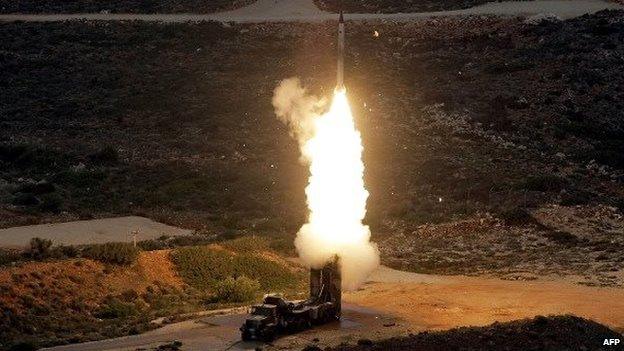Russia to provide Iran with S-300 air defence missiles
- Published

The S-300 could greatly improve Iran's air defences
Russia has signed a contract to supply Iran with sophisticated S-300 surface-to-air missiles.
The contract got the go-ahead after international sanctions on Iran were lifted earlier this year, following a deal over its nuclear programme.
Israel, the US and Saudi Arabia are all opposed to the missile contract.
Russian officials say the first batch could be delivered 18 months after Iran has specified the S-300 type that it wants. Technical talks are continuing.
"The deal to supply the S-300 to Iran has not only been signed between the parties but it has already come into force," said Sergei Chemezov, head of Russia's Rostec arms firm, speaking at the Dubai Airshow-2015.
The $800m (£545m) contract, signed in 2007, was frozen by Russia in 2010 because of the international sanctions. President Vladimir Putin unfroze it in April.
Israel and the US fear the missiles could be used to protect Iranian nuclear sites from air strikes.

The missiles can shoot down jets and other missiles hundreds of kilometres away
The S-300 can be used against multiple targets including jets, or to shoot down other missiles.
The S-300B4 variant - delivered to the Russian armed forces last year - can shoot down any medium-range missile in the world today, flies at five times the speed of sound and has a range of 400km (248 miles), Tass reports.
Profile: Russia's S-300 missile system
When the Russian deal was suspended Iran filed a lawsuit seeking billions of dollars in damages.
Mr Chemezov said Saudi Arabia had asked Rostec repeatedly not to supply the S-300 to Iran.
But he insisted that it was a defensive weapon. "So if the Gulf countries are not going to attack Iran... why should they be threatened? Because this is defence equipment," Reuters news agency quoted him as saying.